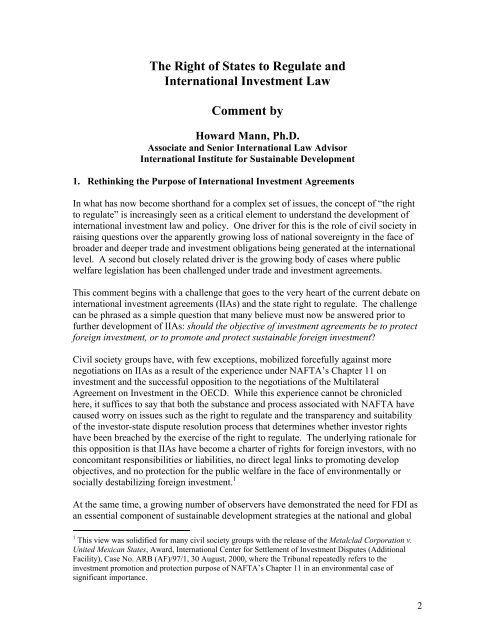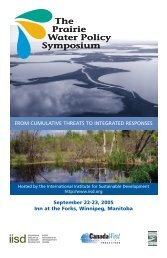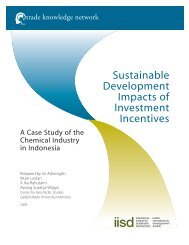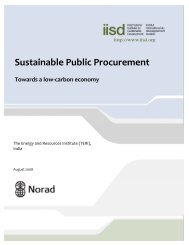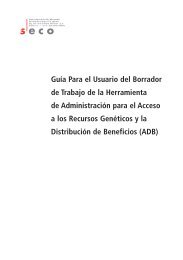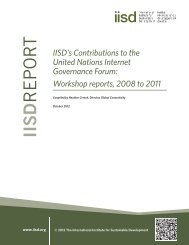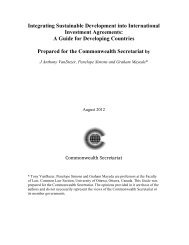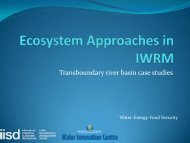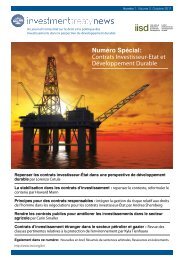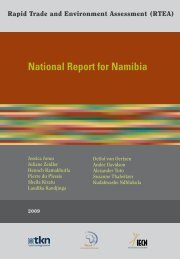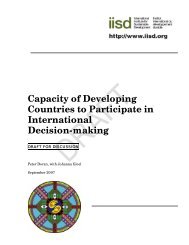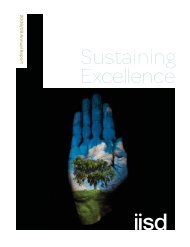The Right of States to Regulate and International Investment Law
The Right of States to Regulate and International Investment Law
The Right of States to Regulate and International Investment Law
You also want an ePaper? Increase the reach of your titles
YUMPU automatically turns print PDFs into web optimized ePapers that Google loves.
<strong>The</strong> <strong>Right</strong> <strong>of</strong> <strong>States</strong> <strong>to</strong> <strong>Regulate</strong> <strong>and</strong><br />
<strong>International</strong> <strong>Investment</strong> <strong>Law</strong><br />
Comment by<br />
Howard Mann, Ph.D.<br />
Associate <strong>and</strong> Senior <strong>International</strong> <strong>Law</strong> Advisor<br />
<strong>International</strong> Institute for Sustainable Development<br />
1. Rethinking the Purpose <strong>of</strong> <strong>International</strong> <strong>Investment</strong> Agreements<br />
In what has now become shorth<strong>and</strong> for a complex set <strong>of</strong> issues, the concept <strong>of</strong> “the right<br />
<strong>to</strong> regulate” is increasingly seen as a critical element <strong>to</strong> underst<strong>and</strong> the development <strong>of</strong><br />
international investment law <strong>and</strong> policy. One driver for this is the role <strong>of</strong> civil society in<br />
raising questions over the apparently growing loss <strong>of</strong> national sovereignty in the face <strong>of</strong><br />
broader <strong>and</strong> deeper trade <strong>and</strong> investment obligations being generated at the international<br />
level. A second but closely related driver is the growing body <strong>of</strong> cases where public<br />
welfare legislation has been challenged under trade <strong>and</strong> investment agreements.<br />
This comment begins with a challenge that goes <strong>to</strong> the very heart <strong>of</strong> the current debate on<br />
international investment agreements (IIAs) <strong>and</strong> the state right <strong>to</strong> regulate. <strong>The</strong> challenge<br />
can be phrased as a simple question that many believe must now be answered prior <strong>to</strong><br />
further development <strong>of</strong> IIAs: should the objective <strong>of</strong> investment agreements be <strong>to</strong> protect<br />
foreign investment, or <strong>to</strong> promote <strong>and</strong> protect sustainable foreign investment?<br />
Civil society groups have, with few exceptions, mobilized forcefully against more<br />
negotiations on IIAs as a result <strong>of</strong> the experience under NAFTA’s Chapter 11 on<br />
investment <strong>and</strong> the successful opposition <strong>to</strong> the negotiations <strong>of</strong> the Multilateral<br />
Agreement on <strong>Investment</strong> in the OECD. While this experience cannot be chronicled<br />
here, it suffices <strong>to</strong> say that both the substance <strong>and</strong> process associated with NAFTA have<br />
caused worry on issues such as the right <strong>to</strong> regulate <strong>and</strong> the transparency <strong>and</strong> suitability<br />
<strong>of</strong> the inves<strong>to</strong>r-state dispute resolution process that determines whether inves<strong>to</strong>r rights<br />
have been breached by the exercise <strong>of</strong> the right <strong>to</strong> regulate. <strong>The</strong> underlying rationale for<br />
this opposition is that IIAs have become a charter <strong>of</strong> rights for foreign inves<strong>to</strong>rs, with no<br />
concomitant responsibilities or liabilities, no direct legal links <strong>to</strong> promoting develop<br />
objectives, <strong>and</strong> no protection for the public welfare in the face <strong>of</strong> environmentally or<br />
socially destabilizing foreign investment. 1<br />
At the same time, a growing number <strong>of</strong> observers have demonstrated the need for FDI as<br />
an essential component <strong>of</strong> sustainable development strategies at the national <strong>and</strong> global<br />
1 This view was solidified for many civil society groups with the release <strong>of</strong> the Metalclad Corporation v.<br />
United Mexican <strong>States</strong>, Award, <strong>International</strong> Center for Settlement <strong>of</strong> <strong>Investment</strong> Disputes (Additional<br />
Facility), Case No. ARB (AF)/97/1, 30 August, 2000, where the Tribunal repeatedly refers <strong>to</strong> the<br />
investment promotion <strong>and</strong> protection purpose <strong>of</strong> NAFTA’s Chapter 11 in an environmental case <strong>of</strong><br />
significant importance.<br />
2


